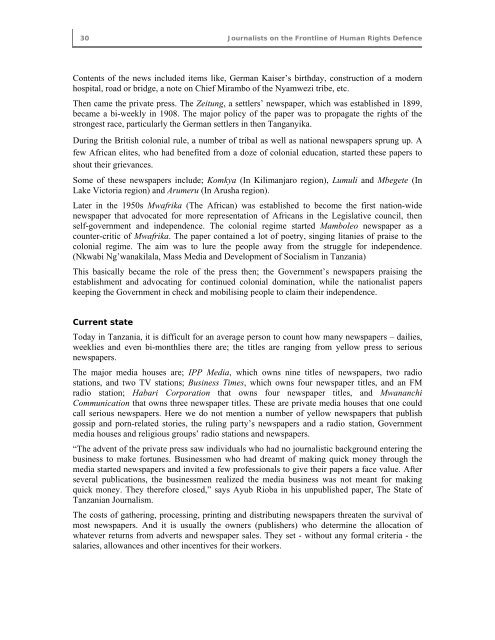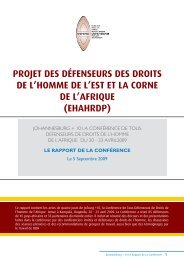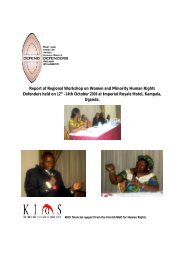English PDF - East and Horn of Africa Human Rights Defenders ...
English PDF - East and Horn of Africa Human Rights Defenders ...
English PDF - East and Horn of Africa Human Rights Defenders ...
You also want an ePaper? Increase the reach of your titles
YUMPU automatically turns print PDFs into web optimized ePapers that Google loves.
30Journalists on the Frontline <strong>of</strong> <strong>Human</strong> <strong>Rights</strong> DefenceContents <strong>of</strong> the news included items like, German Kaiser’s birthday, construction <strong>of</strong> a modernhospital, road or bridge, a note on Chief Mirambo <strong>of</strong> the Nyamwezi tribe, etc.Then came the private press. The Zeitung, a settlers’ newspaper, which was established in 1899,became a bi-weekly in 1908. The major policy <strong>of</strong> the paper was to propagate the rights <strong>of</strong> thestrongest race, particularly the German settlers in then Tanganyika.During the British colonial rule, a number <strong>of</strong> tribal as well as national newspapers sprung up. Afew <strong>Africa</strong>n elites, who had benefited from a doze <strong>of</strong> colonial education, started these papers toshout their grievances.Some <strong>of</strong> these newspapers include; Komkya (In Kilimanjaro region), Lumuli <strong>and</strong> Mbegete (InLake Victoria region) <strong>and</strong> Arumeru (In Arusha region).Later in the 1950s Mwafrika (The <strong>Africa</strong>n) was established to become the first nation-widenewspaper that advocated for more representation <strong>of</strong> <strong>Africa</strong>ns in the Legislative council, thenself-government <strong>and</strong> independence. The colonial regime started Mamboleo newspaper as acounter-critic <strong>of</strong> Mwafrika. The paper contained a lot <strong>of</strong> poetry, singing litanies <strong>of</strong> praise to thecolonial regime. The aim was to lure the people away from the struggle for independence.(Nkwabi Ng’wanakilala, Mass Media <strong>and</strong> Development <strong>of</strong> Socialism in Tanzania)This basically became the role <strong>of</strong> the press then; the Government’s newspapers praising theestablishment <strong>and</strong> advocating for continued colonial domination, while the nationalist paperskeeping the Government in check <strong>and</strong> mobilising people to claim their independence.Current stateToday in Tanzania, it is difficult for an average person to count how many newspapers – dailies,weeklies <strong>and</strong> even bi-monthlies there are; the titles are ranging from yellow press to seriousnewspapers.The major media houses are; IPP Media, which owns nine titles <strong>of</strong> newspapers, two radiostations, <strong>and</strong> two TV stations; Business Times, which owns four newspaper titles, <strong>and</strong> an FMradio station; Habari Corporation that owns four newspaper titles, <strong>and</strong> MwananchiCommunication that owns three newspaper titles. These are private media houses that one couldcall serious newspapers. Here we do not mention a number <strong>of</strong> yellow newspapers that publishgossip <strong>and</strong> porn-related stories, the ruling party’s newspapers <strong>and</strong> a radio station, Governmentmedia houses <strong>and</strong> religious groups’ radio stations <strong>and</strong> newspapers.“The advent <strong>of</strong> the private press saw individuals who had no journalistic background entering thebusiness to make fortunes. Businessmen who had dreamt <strong>of</strong> making quick money through themedia started newspapers <strong>and</strong> invited a few pr<strong>of</strong>essionals to give their papers a face value. Afterseveral publications, the businessmen realized the media business was not meant for makingquick money. They therefore closed,” says Ayub Rioba in his unpublished paper, The State <strong>of</strong>Tanzanian Journalism.The costs <strong>of</strong> gathering, processing, printing <strong>and</strong> distributing newspapers threaten the survival <strong>of</strong>most newspapers. And it is usually the owners (publishers) who determine the allocation <strong>of</strong>whatever returns from adverts <strong>and</strong> newspaper sales. They set - without any formal criteria - thesalaries, allowances <strong>and</strong> other incentives for their workers.








